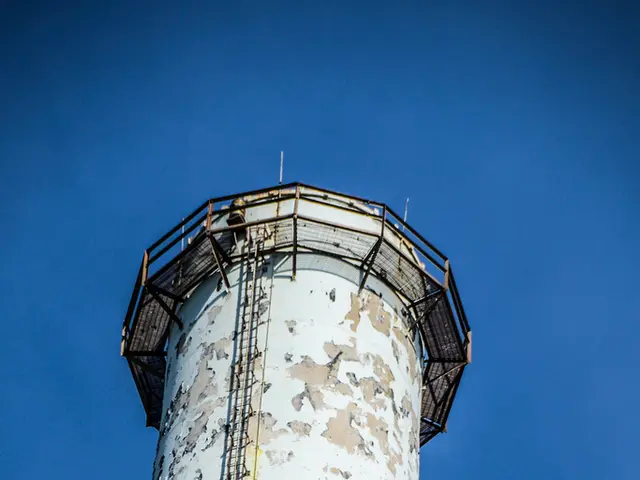Damascus is descending into a state of organized violence against a particular group.
First-Ever Talks Between Syria's Interim Government and the U.S. Go Down in New York
The Syrian transitional government finally sat down for a face-to-face with American diplomats, cloaked in secrecy in the Big Apple on April 29. The heart of the discussion revolved around the question of easing United States sanctions on Syria, initially imposed during the rule of former President Bashar al-Assad. However, the talks were marred by escalating violence within Syria along sectarian lines, particularly in Damascus.
New York served host to the meeting, rather than Washington, due to visa challenges blocking Syrian representatives from entering the nation's capital. Additionally, Syrian delegates were scheduled to participate in a UN Security Council meeting onsite.
When asked about the gathering, the State Department confirmed the presence of a Syrian delegation in the U.S, attending various UN meetings. State Department spokesperson Tammy Burch hinted at an evolving Syria policy, commenting that the administration would carefully assess the actions of the transitional authorities. They're yet to pursue full normalization with Syria.
Sources close to the negotiations reveal that the Syrian diplomats sought concrete promises from the U.S. regarding the complete lifting of sanctions and inquired about realistic timelines for fulfilling Washington's demands. Previously, the U.S. had presented Syria with a list of conditions, including the eradication of lingering chemical weapons, curbing foreign fighter activities, and aiding in the location of an American freelance journalist, Austin Tice.
Tensions in the already intricate negotiations intensified on April 29, with a wave of violence sweeping through the Druze-populated suburb of Jaramana in Damascus. Least fourteen people lost their lives, allegedly at the hands of unknown assailants. The disturbance was sparked by a divisive audio recording alleged to have originated from a Druze religious figure, insulting the Prophet Muhammad. Though Druze clergy dissociated themselves from the scandalous recording, they placed blame on the transitional government for the ensuing clashes and the deteriorating situation.
Previously, tensions in Jaramana had already been bubbling since late February, when a firefight erupted between transitional government security personnel and local self-defense forces at a checkpoint. The Israeli Prime Minister, Benjamin Netanyahu, and Defense Minister, Israel Katz, had ordered the Israeli military to prepare contingency plans in the event that Syrian government forces decided to attack Jaramana, which is situated just 3 km southeast of Damascus. "We will not tolerate a radical Islamic terrorist regime in Syria to attack the Druze," Netanyahu warned. "If the Syrian regime dares to strike the Druze, it will face our response."
In a separate incident, unknown attackers targeted a city of Homs inhabited by Alawites, a Shiite minority to which President al-Assad and his former circle belong. More than ten inhabitants perished in the massacre, marking the first such attack since an early March massacre on the Syrian coast.
According to UN Special Envoy for Syria Geir Pedersen, current Syria remains a powder keg, with sympathizers of both the transitional government and the former regime motivated by a sense of grievance. He concluded that the only viable solution is equal rights for all Syrian communities.
Controversy Surrounding U.S. Conditions for Relief from Sanctions
The U.S. has clearly stated its conditions for sanctions relief on Syria's transitional government. The conditions are not tied to deadlines, focusing instead on verifiable actions. Key points encompass:
- Chemical weapons destruction: Completely and verifiably dismantling Syria's chemical weapons stockpiles.
- Counterterrorism efforts: Expelling foreign terrorist fighters, barring groups like Palestinian militants, and suppressing groups such as the PKK/YPG (a priority for Turkey).
- Regional influence: Preventing Iranian and Russian exploitation of Syrian territory.
- Humanitarian steps: Assisting in recovering disappeared U.S. citizens and protecting religious/ethnic minorities.
International bodies like the UN have concurrently advocated for broader sanctions to be eased to facilitate post-war recovery.
Neil Kerbelov
The Syrian transitional government's talks with the U.S. in New York centered on easing sanctions, with the U.S. presenting conditions for potential relief. Concrete promises regarding the complete lifting of sanctions were sought by the Syrian delegates, including the dismantling of Syria's chemical weapons stockpiles, eradicating foreign terrorist fighters, and preventing Iranian and Russian exploitation of Syrian territory. These conditions are not tied to deadlines but focus on verifiable actions. Despite these discussions, escalating violence in Syria, particularly in Damascus, poses dangers that could hinder progress in war-and-conflicts, politics, and general news.







